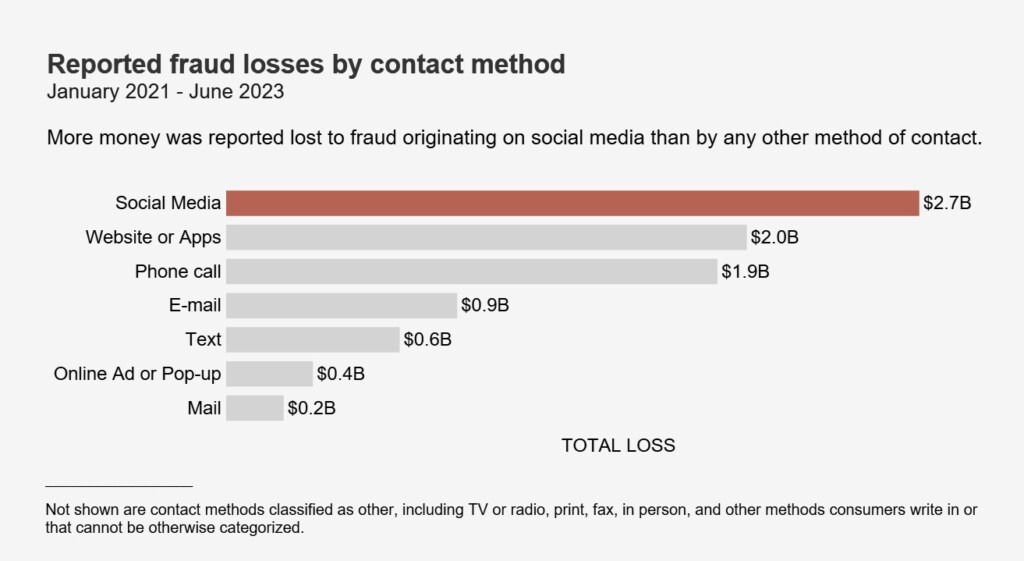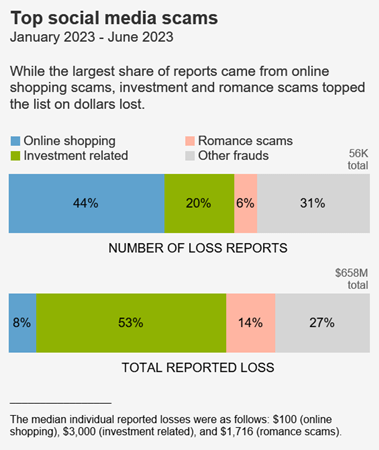Social Media – Where Scams Are Born!
By U.S. Federal Trade Commission
Social Media: A Golden Goose For Scammers
Scammers are hiding in plain sight on social media platforms and reports to the FTC’s Consumer Sentinel Network point to huge profits. One in four people who reported losing money to fraud since 2021 said it started on social media.[1] Reported losses to scams on social media during the same period hit a staggering $2.7 billion, far higher than any other method of contact. And because the vast majority of frauds are not reported, this figure reflects just a small fraction of the public harm.[2]
Social media gives scammers an edge in several ways. They can easily manufacture a fake persona, or hack into your profile, pretend to be you, and con your friends. They can learn to tailor their approach from what you share on social media. And scammers who place ads can even use tools available to advertisers to methodically target you based on personal details, such as your age, interests, or past purchases. All of this costs them next to nothing to reach billions of people from anywhere in the world.
Reports show that scams on social media are a problem for people of all ages, but the numbers are most striking for younger people. In the first six months of 2023, in reports of money lost to fraud by people 20-29, social media was the contact method more than 38% of the time. For people 18-19, that figure was 47%.[3] The numbers decrease with age, consistent with generational differences in social media use.[4]
The most frequently reported fraud loss in the first half of 2023 was from people who tried to buy something marketed on social media, coming in at a whopping 44% of all social media fraud loss reports. Most of these reports are about undelivered goods, with no-show clothing and electronics topping the list.[5] According to reports, these scams most often start with an ad on Facebook or Instagram.[6]
While online shopping scams have the highest number of reports, the largest share of dollar losses are to scams that use social media to promote fake investment opportunities.[7] In the first six months of 2023, more than half the money reported lost to fraud on social media went to investment scammers. To draw people in, these scammers promote their own supposed investment success, often trying to lure people to investment websites and apps that turn out to be bogus. They make promises of huge returns, and even make it look like an “investment” is growing. But if people invest, and reports say it’s usually in cryptocurrency,[8] they end up empty handed.
After investment scams, reports point to romance scams as having the second highest losses on social media. In the first six months of 2023, half of people who said they lost money to an online romance scam said it began on Facebook, Instagram, or Snapchat.[9] These scams often start with a seemingly innocent friend request from a stranger followed by love bombing and the inevitable request for money.
Here are some ways to steer clear of scams on social media:
- Limit who can see your posts and information on social media. All platforms collect information about you from your activities on social media, but visit your privacy settings to set some restrictions.
- If you get a message from a friend about an opportunity or an urgent need for money, call them. Their account may have been hacked—especially if they ask you to pay by cryptocurrency, gift card, or wire transfer. That’s how scammers ask you to pay.
- If someone appears on your social media and rushes you to start a friendship or romance, slow down. Read about romance scams. And never send money to someone you haven’t met in person.
- Before you buy, check out the company. Search online for its name plus “scam” or “complaint.”
To learn more about how to spot, avoid, and report scams—and how to recover money if you’ve paid a scammer—visit ftc.gov/scams. If you spot a scam, report it to the FTC – learn how at reporting.AgainstScams.org.
REFERENCES:
[1] This figure excludes reports that did not specify a contact method. Including reports directly to the FTC and reports provided by Sentinel data contributors, 257,945 reports about money lost to fraud originating on social media were filed from January 2021 through June 2023.
[2] See Anderson, K. B., To Whom Do Victims of Mass-Market Consumer Fraud Complain? at 1 (May 2021), available at https://papers.ssrn.com/sol3/papers.cfm?abstract_id=3852323 (study showed only 4.8% of people who experienced mass-market consumer fraud complained to a Better Business Bureau or a government entity).
[3] These figures exclude reports that did not specify a contact method and reports that did not include age information.
[4] See Pew Research Center, Social Media Use in 2021 (April 2021), available at https://www.pewresearch.org/internet/2021/04/07/social-media-use-in-2021/ (study showed people ages 18-29 reported the highest social media use at 84%, followed by ages 30-49 at 81%, ages 50-64 at 73% and 65 and over at 45%). In the first 6 months of 2023, the share of loss reports indicating social media as the contact method by age was as follows: 47% (18-19), 38% (20-29), 32% (30-39), 28% (40-49), 26% (50-59), 21% (60-69), 15% (70-79), 9% (80 and over). Social media was the top contact method ranked by fraud loss reports for all age groups under age 70, while phone call was the top contact method for the 70-79 and 80 and over age groups.
[5] The top undelivered items were identified by hand-coding a random sample of 400 reports that contained a narrative description identifying the items ordered.
[6] In the first 6 months of 2023, people reported undelivered merchandise in 61% of loss reports about online shopping fraud originating on social media. Facebook was identified as the social media platform in 60% of these reports, and Instagram was identified in 24%. This excludes reports that did not identify a platform.
[7] The top platforms identified in these reports were Instagram (30%), Facebook (26%), WhatsApp (13%), and Telegram (9%). Reports that did not indicate a platform are excluded from these calculations.
[8] In the first 6 months of 2023, cryptocurrency was identified as the payment method in 53% of investment-related fraud reports that indicated social media as the method of contact. This excludes reports that did not specify a payment method.
[9] Facebook and Instagram were each identified in 21% of these reports, followed by Snapchat at 8%. This excludes reports that did not specify the platform, website, or app.
More:
- Federal Trade Commission Partners with Latin America To Combat Fraud (scamsnow.com)
- FTC Takes Action Against Unsolicited Communications (scamsnow.com)
- Robocall Refunds From The FTC & State Of Florida $540,000 (scamsnow.com)
- Walmart Facilitated Scams According To The FTC (scamsnow.com)
- From the FTC: Hey, Alexa! What are you doing with My Data? (scamsnow.com)
- University of Phoenix Scam (scamsnow.com)
- Facebook Is Using Your Tax Data! (scamsnow.com)
SCARS Resources:
- For New Victims of Relationship Scams newvictim.AgainstScams.org
- Subscribe to SCARS Newsletter newsletter.againstscams.org
- Sign up for SCARS professional support & recovery groups, visit support.AgainstScams.org
- Find competent trauma counselors or therapists, visit counseling.AgainstScams.org
- Become a SCARS Member and get free counseling benefits, visit membership.AgainstScams.org
- Report each and every crime, learn how to at reporting.AgainstScams.org
- Learn more about Scams & Scammers at RomanceScamsNOW.com and ScamsNOW.com
- Global Cyber Alliance ACT Cybersecurity Tool Website: Actionable Cybersecurity Tools (ACT) (globalcyberalliance.org)
- Self-Help Books for Scam Victims are at shop.AgainstScams.org
- Donate to SCARS and help us help others at donate.AgainstScams.org
- Worldwide Crisis Hotlines: International Suicide Hotlines – OpenCounseling : OpenCounseling
- Campaign To End Scam Victim Blaming – 2024 (scamsnow.com)
More ScamsNOW.com Articles
-/ 30 /-
What do you think about this?
Please share your thoughts in a comment below!
SCARS LINKS: AgainstScams.org RomanceScamsNOW.com ContraEstafas.org ScammerPhotos.com Anyscam.com ScamsNOW.com
reporting.AgainstScams.org support.AgainstScams.org membership.AgainstScams.org donate.AgainstScams.org shop.AgainstScams.org
youtube.AgainstScams.org linkedin.AgainstScams.org facebook.AgainstScams.org
TABLE OF CONTENTS
CATEGORIES
![NavyLogo@4x-81[1] Social Media - Where Scams Are Born!](https://scamsnow.com/wp-content/uploads/2025/04/NavyLogo@4x-811.png)
ARTICLE META
Important Information for New Scam Victims
- Please visit www.ScamVictimsSupport.org – a SCARS Website for New Scam Victims & Sextortion Victims.
- SCARS Institute now offers its free, safe, and private Scam Survivor’s Support Community at www.SCARScommunity.org – this is not on a social media platform, it is our own safe & secure platform created by the SCARS Institute especially for scam victims & survivors.
- SCARS Institute now offers a free recovery learning program at www.SCARSeducation.org.
- Please visit www.ScamPsychology.org – to more fully understand the psychological concepts involved in scams and scam victim recovery.
If you are looking for local trauma counselors, please visit counseling.AgainstScams.org
If you need to speak with someone now, you can dial 988 or find phone numbers for crisis hotlines all around the world here: www.opencounseling.com/suicide-hotlines
Statement About Victim Blaming
Some of our articles discuss various aspects of victims. This is both about better understanding victims (the science of victimology) and their behaviors and psychology. This helps us to educate victims/survivors about why these crimes happened and not to blame themselves, better develop recovery programs, and help victims avoid scams in the future. At times, this may sound like blaming the victim, but it does not blame scam victims; we are simply explaining the hows and whys of the experience victims have.
These articles, about the Psychology of Scams or Victim Psychology – meaning that all humans have psychological or cognitive characteristics in common that can either be exploited or work against us – help us all to understand the unique challenges victims face before, during, and after scams, fraud, or cybercrimes. These sometimes talk about some of the vulnerabilities the scammers exploit. Victims rarely have control of them or are even aware of them, until something like a scam happens, and then they can learn how their mind works and how to overcome these mechanisms.
Articles like these help victims and others understand these processes and how to help prevent them from being exploited again or to help them recover more easily by understanding their post-scam behaviors. Learn more about the Psychology of Scams at www.ScamPsychology.org
SCARS INSTITUTE RESOURCES:
If You Have Been Victimized By A Scam Or Cybercrime
♦ If you are a victim of scams, go to www.ScamVictimsSupport.org for real knowledge and help
♦ SCARS Institute now offers its free, safe, and private Scam Survivor’s Support Community at www.SCARScommunity.org/register – this is not on a social media platform, it is our own safe & secure platform created by the SCARS Institute especially for scam victims & survivors.
♦ Enroll in SCARS Scam Survivor’s School now at www.SCARSeducation.org
♦ To report criminals, visit https://reporting.AgainstScams.org – we will NEVER give your data to money recovery companies like some do!
♦ Follow us and find our podcasts, webinars, and helpful videos on YouTube: https://www.youtube.com/@RomancescamsNowcom
♦ Learn about the Psychology of Scams at www.ScamPsychology.org
♦ Dig deeper into the reality of scams, fraud, and cybercrime at www.ScamsNOW.com and www.RomanceScamsNOW.com
♦ Scam Survivor’s Stories: www.ScamSurvivorStories.org
♦ For Scam Victim Advocates visit www.ScamVictimsAdvocates.org
♦ See more scammer photos on www.ScammerPhotos.com
You can also find the SCARS Institute’s knowledge and information on Facebook, Instagram, X, LinkedIn, and TruthSocial
Psychology Disclaimer:
All articles about psychology and the human brain on this website are for information & education only
The information provided in this and other SCARS articles are intended for educational and self-help purposes only and should not be construed as a substitute for professional therapy or counseling.
Note about Mindfulness: Mindfulness practices have the potential to create psychological distress for some individuals. Please consult a mental health professional or experienced meditation instructor for guidance should you encounter difficulties.
While any self-help techniques outlined herein may be beneficial for scam victims seeking to recover from their experience and move towards recovery, it is important to consult with a qualified mental health professional before initiating any course of action. Each individual’s experience and needs are unique, and what works for one person may not be suitable for another.
Additionally, any approach may not be appropriate for individuals with certain pre-existing mental health conditions or trauma histories. It is advisable to seek guidance from a licensed therapist or counselor who can provide personalized support, guidance, and treatment tailored to your specific needs.
If you are experiencing significant distress or emotional difficulties related to a scam or other traumatic event, please consult your doctor or mental health provider for appropriate care and support.
Also read our SCARS Institute Statement about Professional Care for Scam Victims – click here
If you are in crisis, feeling desperate, or in despair, please call 988 or your local crisis hotline – international numbers here.
More ScamsNOW.com Articles
A Question of Trust
At the SCARS Institute, we invite you to do your own research on the topics we speak about and publish. Our team investigates the subject being discussed, especially when it comes to understanding the scam victims-survivors’ experience. You can do Google searches, but in many cases, you will have to wade through scientific papers and studies. However, remember that biases and perspectives matter and influence the outcome. Regardless, we encourage you to explore these topics as thoroughly as you can for your own awareness.


























![scars-institute[1] Social Media - Where Scams Are Born!](https://scamsnow.com/wp-content/uploads/2025/04/scars-institute1.png)

![niprc1.png1_-150×1501-1[1] Social Media - Where Scams Are Born!](https://scamsnow.com/wp-content/uploads/2025/04/niprc1.png1_-150x1501-11.webp)